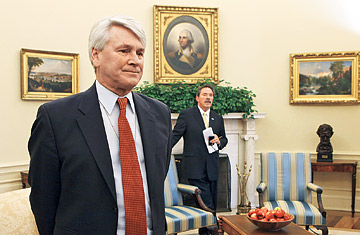
Obama turned to Craig to roll back Bush-era policies in the war on terrorism. But by September, Craig had been sidelined by pragmatists.
(2 of 5)
Four days after the 2008 election, Obama tasked Craig with dismantling Bush's interrogation and detention policies. Craig seemed the logical choice. An Ivy League--trained lawyer and former top staffer for Ted Kennedy, he had taken on politically unpopular causes over the years, including representing Elián González's father in his effort to return his son to Cuba. Craig helped defend his law-school classmate Bill Clinton against impeachment, but he broke from the Clintons in 2007 to back Obama and became a key player in his meteoric rise to the presidency.
Avuncular and white-maned, Craig had at one time imagined he might steer foreign policy in the new Administration, possibly as National Security Adviser. Instead, he was named Obama's top lawyer. Craig lost no time creating one of the largest White House counsel's offices ever, with dozens of high-powered lawyers, compared with only a handful who served under Bush in early 2001. Staffed with brainy graduates of Yale and Harvard law schools, Craig's office was an instant power center in the White House, able to produce answers, memos and ideas seemingly overnight while other parts of the Administration were still getting up and running.
Craig won early victories for the liberal agenda. Against resistance from the intelligence agencies, he drafted a series of Executive Orders that ended the CIA's "enhanced interrogation" of suspected terrorists, suspended extrajudicial powers for holding and trying detainees and set a one-year deadline to close the prison at Guantánamo Bay. Obama signed the orders two days into his Administration. Craig was delivering much of the change Obama had promised during the campaign.
But Bush's legacy in the war on terrorism was being rolled back even faster in the courts, and soon Obama and Craig found themselves not rallying reformers but playing defense against the American Civil Liberties Union, which had sued the government under Bush in search of mountains of data and documents. The courts had ordered Bush to release classified Department of Justice memos that detailed and endorsed the use of harsh tactics like sleep deprivation in the CIA's interrogation of suspects. On March 15, Craig informed Obama that, faced with a court deadline, the Justice Department planned to make public these so-called torture memos in three days. As with the abuse photos, the issue tested Obama's commitment to openness.
Obama, a onetime constitutional-law professor, told Craig he needed more time and asked for an extension. But when Michael Hayden, Bush's CIA director who had stayed on in Obama's first month, learned that the memos might be released, he went ballistic.
"What are you doing?" Hayden, just retired, demanded in a March 18 call to Craig. If Obama released the memos, Hayden argued, al-Qaeda would be able to train its warriors to resist the techniques described in their contents.
"The President is never going to authorize any of those techniques," Craig replied assuredly, so there was no danger in disclosing the methods to the enemy.
Hayden pressed on: "Lemme get this right. There are no conditions of threat this nation might face that would prompt you to interrupt the sleep cycle of somebody who may have lifesaving information?"
There was a long silence. Craig would not concede the point.
